Phosphatidylserine and Dissociation: Supporting Cognitive Function
Introduction
When you live with dissociation, it often feels like your brain is working through fog. Thoughts blur together, focus slips, and memories feel fragmented — as if someone dimmed the lights inside your mind. You know you’re there, but you can’t fully connect.
This cognitive haziness isn’t just emotional — it’s biological. Dissociation involves a deep shift in brain chemistry and structure caused by chronic stress or trauma. The brain redirects energy away from higher reasoning areas toward survival systems, leaving regions involved in memory, attention, and awareness underpowered.
That’s where phosphatidylserine (PS) may help. This natural compound, found in every cell membrane (especially brain cells), supports neurotransmitter signaling, protects neurons from stress, and maintains cognitive speed.
In recent years, researchers have begun exploring how phosphatidylserine supplementation can enhance focus, memory, and stress resilience — three areas commonly impaired in dissociation. By strengthening brain cell communication and reducing cortisol, it may help the mind reconnect and function more clearly.
Let’s explore how phosphatidylserine works, what makes it unique, and how it might support cognitive function for people healing from dissociation 🌙.
Looking for supplements for This? Click here.
Dissociation and Cognitive Dysfunction: The Disconnection Effect 🌫️
Dissociation often develops as the brain’s ultimate safety mechanism. When overwhelming stress or trauma hits, the nervous system activates survival circuits — first fight or flight, then freeze. In the freeze (or dorsal vagal) state, awareness narrows, emotions flatten, and cognitive processing slows down.
Neuroimaging studies show that in dissociation, communication between key brain regions — such as the prefrontal cortex (rational thought), hippocampus (memory), and insula (body awareness) — becomes disrupted. The result is mental fog, forgetfulness, and a loss of continuity between thought and feeling.
At the cellular level, this disruption involves:
Mitochondrial fatigue: neurons can’t produce enough ATP (energy) to function efficiently.
Membrane degradation: chronic cortisol and oxidative stress damage the fatty layers around brain cells.
Reduced neurotransmitter sensitivity: serotonin, dopamine, and acetylcholine receptors become less responsive.
Phosphatidylserine directly addresses these biological weak points — rebuilding the very membranes that neurons rely on to communicate.
What Is Phosphatidylserine? 🧬
Phosphatidylserine (PS) is a phospholipid — a type of fat molecule that forms the outer layer of cell membranes. It’s especially concentrated in the brain, where it helps maintain the structure and flexibility of neuronal membranes.
Think of it as the “communication surface” of your brain cells. Neurotransmitters like dopamine, acetylcholine, and serotonin bind to these membranes to send signals. When the membranes are healthy and fluid, messages travel quickly. When they’re stiff or damaged by stress, communication slows down — and cognitive fog sets in.
Phosphatidylserine keeps these membranes elastic and functional. It also signals the body to clean up damaged cells and supports new neuron growth. Over time, this improves synaptic efficiency, memory formation, and mental energy.
The Stress Connection: Cortisol and Cognitive Shutdown ⚡

One of the most well-documented effects of phosphatidylserine is its ability to regulate cortisol, the body’s main stress hormone.
During trauma or chronic stress, cortisol floods the brain to prepare for threat. But prolonged exposure damages neurons in the hippocampus — the area responsible for memory and orientation. This can lead to confusion, poor recall, and disorientation, all common features of dissociation.
Phosphatidylserine helps by modulating cortisol release. Studies show it can lower cortisol spikes during acute stress and promote quicker recovery after stressful events. By doing so, it prevents the cognitive “crash” that follows prolonged activation of the stress response.
In short, PS helps your brain shift from protection mode back to connection mode.
Neurotransmitter Support: Reconnecting Chemical Pathways 🔄
Dissociation often disrupts the brain’s chemical signaling network. The receptors for serotonin, dopamine, and acetylcholine — neurotransmitters tied to mood, motivation, and cognition — become less responsive due to oxidative stress and lipid damage.
Phosphatidylserine restores the lipid matrix of neuronal membranes, improving how these neurotransmitters bind and function. This helps reestablish smoother communication between emotional and rational brain regions.
Enhanced acetylcholine function, in particular, improves working memory and mental focus, while dopamine stabilization helps rebuild motivation and reward sensitivity — key ingredients in recovering a sense of presence.
Phosphatidylserine and the Brain’s Electrical Network ⚙️
Beyond neurotransmitters, PS influences the brain’s electrical rhythm. Every thought, emotion, and memory involves subtle changes in electrical potential across neuron membranes.
Phosphatidylserine optimizes this electrical activity by maintaining proper ionic balance (sodium, potassium, calcium) and supporting membrane fluidity. This makes neural signaling faster and more synchronized — vital for focus, coordination, and coherent thought.
People with dissociation often report that their minds feel “fragmented.” This sense of fragmentation can arise from asynchronous brainwave activity — the hemispheres not communicating efficiently. Phosphatidylserine’s stabilizing effect on membrane potential can promote neural coherence, allowing both hemispheres to communicate more effectively.
Memory and Cognitive Flexibility 🌸
Research consistently shows that phosphatidylserine improves short-term memory, processing speed, and mental flexibility — especially in situations of fatigue or stress.
A 2010 double-blind study published in Journal of Clinical Biochemistry and Nutrition found that participants who took 300 mg of PS daily for six months showed significant improvements in memory recall, attention, and verbal communication compared to placebo.
These results are not limited to aging populations. In younger adults under chronic stress, PS improves multitasking, reaction time, and the ability to stay mentally clear during pressure.
For people experiencing dissociative fog — where attention and memory often slip under stress — this can be transformative. It gives the brain back the resources it needs to stay present.
The Link Between Cell Membranes and Emotional Integration 💫
One of the most overlooked aspects of trauma is how it affects cell membranes. Chronic stress increases lipid peroxidation — the oxidation (or “rusting”) of fats that make up brain cell walls.
This damage affects more than just cognitive processing; it also influences how emotions are transmitted and integrated. Emotional regulation relies on efficient signaling between limbic (emotional) and prefrontal (executive) regions of the brain. When the “wiring” between these regions weakens, emotions become either blunted (numbness) or overwhelming (panic).
By restoring membrane health, phosphatidylserine supports smoother communication between emotional and cognitive systems. This helps the nervous system experience emotions safely without shutting down — a key goal in trauma recovery.
Mitochondrial Health and Brain Energy ⚡🧠
Every neuron in the brain requires massive amounts of energy to maintain communication. Mitochondria — the energy factories of cells — produce this energy in the form of ATP.
Under chronic stress, mitochondrial efficiency plummets, leading to fatigue and mental dullness. Phosphatidylserine supports mitochondrial function by stabilizing membranes and improving nutrient transport.
This means neurons can produce more ATP and maintain consistent firing patterns. In daily life, that translates to clearer thinking, less fatigue, and a greater sense of mental vitality — even after emotional strain.
Phosphatidylserine and Neuroplasticity 🌿
Neuroplasticity — the brain’s ability to form new connections — is the foundation of trauma healing. Without it, therapeutic progress remains limited.
Phosphatidylserine enhances neuroplasticity by increasing Brain-Derived Neurotrophic Factor (BDNF), a protein that supports neuron growth and connection. With higher BDNF, the brain becomes more adaptable, improving learning, focus, and emotional flexibility.
This adaptability helps you rebuild pathways that dissociation once disrupted — for example, reconnecting sensory awareness with emotional experience, or turning abstract memories into integrated understanding.
Cortisol, Sleep, and Nighttime Recovery 🌙
Chronic dissociation often comes with poor sleep or disrupted circadian rhythms. The body remains alert even at night, keeping cortisol elevated and the mind restless.
Phosphatidylserine can help restore healthy cortisol rhythms. By reducing nighttime cortisol spikes, it promotes deeper, more restorative sleep. This is crucial, since the brain consolidates memory and emotion during REM sleep — both essential processes for integrating trauma.
Many people notice that after a few weeks of phosphatidylserine, they feel less “wired but tired” and wake up clearer, as though their brain has finally rested.
Pairing PS with Other Supportive Nutrients 🌾
Phosphatidylserine works best as part of a synergistic system. Several nutrients complement its effects:
Omega-3 Fatty Acids (DHA and EPA): The brain uses DHA to form healthy membranes, and phosphatidylserine incorporates it to enhance flexibility and signal transmission.
B Vitamins (B6, B9, B12): These cofactors support neurotransmitter synthesis and methylation, improving focus and resilience.
Magnesium Glycinate: Calms overactive neural firing and supports GABA balance.
CoQ10: Boosts mitochondrial energy production and works with PS to enhance ATP generation.
L-Theanine: Promotes alpha brain waves and complements phosphatidylserine’s cognitive-enhancing calm.
Combining these compounds creates a stack that supports both energy and tranquility — a balanced brain state ideal for overcoming dissociative fatigue.
Looking for supplements for This? Click here.
Emotional Presence Through Cellular Stability 💞
When the brain’s biochemistry stabilizes, emotional presence naturally increases. Phosphatidylserine’s subtle effects — improved clarity, balanced cortisol, enhanced neurotransmission — create conditions where it’s safe to feel again.
Imagine your mind as a radio: when the signal is full of static (inflammation, stress hormones, low energy), you can’t hear the music clearly. PS helps tune the frequency — not by changing the station, but by reducing interference.
As clarity returns, emotions become easier to recognize and regulate. Memory integration improves. You start noticing that conversations feel more coherent, that you can stay grounded even when discussing painful topics, and that you recover faster after emotional stress.
Scientific Studies on Phosphatidylserine 🧪
A wealth of studies supports PS’s role in cognitive and stress regulation:
Kato-Kataoka et al., 2010 (Japan): Found that 300 mg of soy-derived PS daily reduced perceived stress and cortisol response in young adults during cognitive testing.
Jorissen et al., 2001 (Netherlands): Reported improvements in short-term memory and reaction speed in middle-aged adults taking PS.
Hellhammer et al., 2004 (Germany): Showed that PS supplementation improved mood and focus in individuals exposed to social stress tests.
Crook et al., 1991 (USA): Demonstrated that PS enhanced memory performance and reduced confusion in older adults with cognitive decline.
Together, these findings confirm phosphatidylserine’s dual effect: improving cognition while protecting the brain from the stress response — exactly the balance needed for dissociative recovery.
How to Take Phosphatidylserine Safely 🌿
Phosphatidylserine is typically derived from soy or sunflower lecithin. Both forms are effective, though sunflower-based PS is preferred for those avoiding soy.
The most common dosage for cognitive support ranges from 100 to 300 mg per day, usually divided into one or two doses. Taking it with food improves absorption.
Some people feel noticeable improvements in focus and calm within one to two weeks, while others experience gradual enhancement over a month of consistent use.
Because PS helps regulate cortisol, taking it in the morning or early afternoon is ideal for daytime clarity. Those using it for nighttime cortisol control may take it before bed under professional guidance.
Phosphatidylserine is generally safe, but if you’re pregnant, nursing, or taking anticoagulants, consult your healthcare provider first.
Beyond Supplements: Integrating Mind and Body 🌸
Supplements like phosphatidylserine can provide the biological foundation for healing, but integration requires more than biochemistry. True recovery from dissociation happens when the mind and body learn to communicate again — through breath, presence, and trust.
Combine PS with daily nervous system-regulating practices like:
Slow breathing to activate the vagus nerve.
Mindful movement (yoga, tai chi, walking).
Grounding exercises (touch, smell, sound awareness).
Trauma-informed therapy or somatic work.
These approaches enhance PS’s benefits by using your newfound mental clarity to anchor emotional awareness.
From Fragmentation to Flow 🌈
Dissociation is the mind’s attempt to protect itself when life feels too intense. But protection can become isolation if the brain’s chemistry remains locked in survival mode.
Phosphatidylserine offers a biological bridge — a way to restore communication, energy, and coherence at the cellular level. By repairing neuronal membranes, balancing cortisol, and improving neurotransmitter function, it helps your brain remember how to operate in flow again.
This isn’t about “fixing” dissociation but supporting reconnection — cell by cell, thought by thought. Over time, presence returns naturally. The fog lifts, memory sharpens, and the sense of self feels solid again.
You begin to live in color instead of grayscale. You start to think and feel in sync. You remember what it’s like to be here 🌿💛.
Looking for online therapy ? Click Here.
References
Kato-Kataoka, A., et al. (2010). “Phosphatidylserine and stress-induced cortisol reduction.” Journal of Clinical Biochemistry and Nutrition, 47(3): 246–255.
Jorissen, B. L., et al. (2001). “The influence of phosphatidylserine on cognitive performance in middle-aged subjects.” European Journal of Clinical Nutrition, 55(4): 342–348.
Hellhammer, J., et al. (2004). “Neuroendocrine and cognitive effects of phosphatidylserine under stress.” Nutritional Neuroscience, 7(3): 103–111.
Crook, T. H., et al. (1991). “Effects of phosphatidylserine in age-associated memory impairment.” Neurology, 41(5): 644–649.
Benton, D. (2010). “The influence of phospholipids on the aging brain.” Nutrition Reviews, 68(10): 585–601.
Blokland, A., et al. (2018). “Cognitive and stress resilience effects of phosphatidylserine.” Nutrients, 10(1): 1–14.
Lanius, R. A., et al. (2018). The Neurobiology and Treatment of Trauma-Related Dissociation. Routledge.
van der Kolk, B. A. (2014). The Body Keeps the Score. Viking.
McEwen, B. S. (2007). “Stress and the aging brain.” Annals of the New York Academy of Sciences, 1113: 111–124.
Kennedy, D. O. (2016). “Nutritional neuroscience: Linking diet, stress, and cognitive health.” Frontiers in Aging Neuroscience, 8: 23.
Related Posts
-

Why Co-Dependency Feels Draining: Adrenal Fatigue and Supplements That Help
The adrenal glands are small but powerful organs that sit above your kidneys, acting as your body’s built-in stress managers. They produce hormones like cortisol and adrenaline that help regulate energy, mood, and resilience. When they’re overworked from chronic stress or emotional exhaustion, fatigue and imbalance follow. Supporting adrenal health naturally can help restore calm, energy, and hormonal balance. 🌿⚡
-

The Link Between Anxiety, Co-Dependency, and Natural Support
Anxiety feels like living in constant alert mode—your heart races, your thoughts loop, and your body can’t find peace. It’s the nervous system’s way of preparing for danger, even when none exists. Understanding what’s happening in your mind and body is the first step toward calming the storm and restoring balance. 🌿💫
-

Supplements That Support Dopamine and Serotonin in Co-Dependent Patterns
Serotonin is the neurotransmitter of calm, confidence, and contentment. When it’s balanced, you feel peaceful and emotionally grounded. When it’s low, anxiety, mood swings, and emotional dependence take over. By understanding serotonin’s role in emotional health—and how to support it naturally—you can rebuild inner stability, improve relationships, and cultivate lasting happiness from within. 🌞💫
-

How Emotional Exhaustion in Codependency Impacts the Nervous System
The nervous system is the body’s communication network, connecting the brain to every organ and muscle. It regulates stress, mood, and emotion through a delicate balance of electrical and chemical signals. When overwhelmed, it can become dysregulated—leading to fatigue, anxiety, and emotional imbalance. Understanding how to calm and strengthen the nervous system is key to healing from chronic stress and emotional burnout. ⚡🌿
-

What Is Co-Dependency? The Role of Brain Chemistry and Stress
Stress is more than a feeling—it’s a full-body experience that begins in the brain and ripples through every cell. When cortisol surges and the nervous system stays on alert, your body can’t rest or recover. Over time, this constant tension affects energy, focus, mood, and even immune health. Understanding stress chemistry is the first step toward breaking free from burnout and finding calm again. 🌿
-

Creating a Supplement Stack for Motivation, Energy, and Anti-Procrastination
Motivation is the fuel behind every meaningful achievement—but it’s not just about willpower. It’s a mix of mindset, brain chemistry, and momentum. When energy, focus, and purpose align, action feels natural instead of forced. Learn how to harness motivation as a daily state, not a fleeting feeling.
-

Supplements for Building Consistency and Reducing Chronic Procrastination
Biochemistry is the bridge between biology and chemistry—the science of life at the molecular level. It explains how nutrients, hormones, and neurotransmitters interact to create energy, thought, and emotion. From brain function to muscle movement, biochemistry reveals the invisible processes that sustain health, balance, and vitality.
-

GABA and Procrastination: Supporting Calm Focus for Productivity
GABA is the brain’s natural calming messenger—a neurotransmitter that helps slow mental overactivity and ease stress. When GABA levels drop, focus fades, anxiety rises, and procrastination becomes more likely. By supporting GABA through nutrition, lifestyle, and supplements, you can restore calm clarity, improve focus, and take action with steady, balanced energy.
-

Ashwagandha and Procrastination: Lowering Stress to Improve Action
Science is the language of curiosity and discovery. It helps us understand the hidden patterns behind life, energy, and the universe. Through experimentation and critical thinking, science connects imagination to evidence—turning questions into knowledge. Whether through microscopes, molecules, or minds at work, science represents our endless pursuit of truth and innovation.
-

Neurotransmitters and Motivation: Supplements That Support Drive and Focus
Supplements can do more than boost physical health—they can also enhance mental clarity, focus, and motivation. Nutrients like omega-3s, magnesium, B vitamins, and adaptogens help balance neurotransmitters, stabilize mood, and support brain energy. When combined with good sleep, nutrition, and mindful habits, they can transform how your brain performs under stress.
-

How Stress Hormones Like Cortisol Fuel Procrastination (and What Helps)
Blood sugar isn’t just about physical health—it directly impacts focus, mood, and motivation. When glucose levels spike and crash, energy and attention do the same, fueling procrastination and brain fog. Learning how to stabilize blood sugar through balanced meals, mindful habits, and key nutrients helps keep your mind steady, focused, and ready to act.
-

Brain Fog and Procrastination: Supplements for Mental Clarity
Brain fog can turn even simple tasks into mental hurdles. When your thoughts feel slow and unclear, procrastination often follows—making focus and productivity seem impossible. This article explores the biochemical and lifestyle causes of brain fog and reveals the most effective supplements for restoring mental clarity, focus, and sustained energy.
-

The Link Between Low Energy and Procrastination: Can Supplements Help?
Neurochemistry shapes how we think, feel, and act. When neurotransmitters like dopamine, serotonin, and GABA fall out of balance, it can lead to fatigue, anxiety, or lack of motivation—fueling procrastination and low mood. Understanding the brain’s chemical communication system helps us find ways to restore focus, calm, and emotional stability through nutrition, mindfulness, and targeted supplements.
-

Why Do We Procrastinate? The Role of Dopamine and Supplements That Support It
Dopamine is the brain’s motivation messenger—the chemical that fuels focus, reward, and drive. When dopamine levels drop, even simple tasks can feel impossible to start. This article explores how dopamine shapes procrastination, motivation, and mental energy, along with natural supplements and daily habits that help restore balance and get things done.
-

Phosphatidylserine and Stress Reduction for People with BDD
Stress is more than a mental state—it’s a full-body experience that affects hormones, brain chemistry, and emotional balance. For people with Body Dysmorphic Disorder (BDD), constant tension and worry about appearance can overload the nervous system. Learning how stress works and finding ways to calm it is key to breaking the cycle of anxiety and self-criticism.
-

How Antioxidants Like Vitamin C & E Support Mental Health in BDD
Antioxidants are the body’s natural defense against stress and inflammation. For people with Body Dysmorphic Disorder (BDD), oxidative stress can worsen fatigue, anxiety, and emotional imbalance. Nutrients like Vitamin C and E help protect brain cells, boost neurotransmitter function, and support a calmer, clearer mindset—building a stronger foundation for recovery.
-

Ginkgo Biloba and Memory Support for BDD Recovery
Emotional regulation is the foundation of healing from Body Dysmorphic Disorder (BDD). When the nervous system stays in constant overdrive, even small stressors can trigger self-critical spirals. Learning to calm emotional reactivity helps restore clarity, confidence, and a sense of inner balance. By blending mindfulness, nervous system support, and self-compassion, you can retrain your brain to respond—not react—to emotion.
-

Alpha GPC and Cognitive Function in Body Dysmorphic Disorder
Mental fatigue can feel like your brain has hit a wall—thoughts slow down, focus fades, and motivation disappears. For people with Body Dysmorphic Disorder (BDD), chronic overthinking, emotional stress, and constant self-evaluation can deplete mental energy even further. Understanding what causes this cognitive exhaustion is the first step toward recovery—through rest, balanced nutrition, and targeted brain-supporting supplements.
-

N-Acetyl L-Tyrosine and BDD: Supporting Mental Clarity
Chronic stress doesn’t just affect your mood—it reshapes your brain chemistry, weakens focus, and fuels the obsessive thought loops common in Body Dysmorphic Disorder (BDD). Over time, constant cortisol elevation drains mental energy and emotional balance. Learning to recognize and manage chronic stress is essential to restoring mental clarity, self-compassion, and resilience.
-

Chamomile and Lavender for Calming Obsessive Body Image Thoughts
The nervous system is the command center of our emotional and physical world—and in Body Dysmorphic Disorder (BDD), it often operates in overdrive. Understanding how the brain and body communicate under stress reveals why intrusive thoughts feel uncontrollable. Learning to regulate the nervous system through calm practices, nutrition, and supplements helps restore inner balance and emotional safety.
-

Adaptogens for Body Dysmorphic Disorder: Rhodiola, Ginseng, and More
Rhodiola rosea, often called the “golden root,” is an adaptogenic herb renowned for boosting stress resilience and mental endurance. For individuals with Body Dysmorphic Disorder (BDD), Rhodiola may help reduce fatigue, regulate cortisol, and enhance emotional balance. By supporting both mind and body, this powerful plant promotes calm focus, improved mood, and renewed energy to face daily challenges.
-

B Vitamins for Stress Resilience in BDD: Rebuilding Calm from Within
Biochemistry is at the heart of every thought, emotion, and reaction we experience. In Body Dysmorphic Disorder (BDD), chemical imbalances in neurotransmitters like serotonin, dopamine, and GABA can amplify stress and distort self-perception. Understanding the biochemistry behind mood and stress regulation offers a path toward healing—bridging the gap between emotional experience and the body’s molecular balance.
-

Melatonin and Body Dysmorphic Disorder: Restoring Healthy Sleep Patterns
Melatonin, the body’s natural sleep hormone, plays a vital role in helping people with Body Dysmorphic Disorder (BDD) restore healthy sleep cycles. When anxiety and obsessive thinking interfere with rest, melatonin levels often drop, leading to more emotional reactivity and distorted self-perception. This article explores how melatonin works, why BDD disrupts it, and how natural supplementation—combined with mindful routines—can help the brain and body finally find calm at night.
-

Sleep Struggles with BDD: Supplements for Rest and Recovery
When you’re living with Body Dysmorphic Disorder (BDD), restful sleep can feel impossible—but the right supplements can help reset your body’s natural rhythm. From magnesium and L-theanine to 5-HTP and ashwagandha, these nutrients support relaxation, lower cortisol, and enhance melatonin production. This article explores how supplements can calm the mind, ease nighttime anxiety, and promote true restorative sleep for emotional and physical recovery.
-

5-HTP and Serotonin Balance: Could It Help with Body Dysmorphic Disorder?
Anxiety can feel like a storm inside the mind—restless, overwhelming, and hard to control. In people with Body Dysmorphic Disorder (BDD), anxiety often fuels obsessive thoughts and self-criticism, creating a painful cycle of worry and self-doubt. This article explores the biological roots of anxiety, the role of neurotransmitters like serotonin and GABA, and how natural strategies such as mindfulness, supplements, and nervous system regulation can restore calm and mental clarity.
-

Can Ashwagandha Help Ease Stress and Anxiety in Body Dysmorphic Disorder?
Neurotransmitters like serotonin, dopamine, GABA, and acetylcholine are the chemical messengers that shape how we think, feel, and react to stress. In Body Dysmorphic Disorder (BDD), imbalances in these neurotransmitters can amplify anxiety, obsessive thinking, and emotional distress. This article explores how restoring healthy brain chemistry through nutrition, supplements, and mindfulness can help bring clarity, calm, and emotional stability.
-

L-Theanine for BDD: Finding Calm in the Mind
Neurochemistry plays a central role in how we think, feel, and see ourselves. For those living with Body Dysmorphic Disorder (BDD), imbalances in neurotransmitters like serotonin, dopamine, and GABA can intensify anxiety, obsessive thoughts, and emotional distress. This article explores how regulating brain chemistry through supplements, mindfulness, and lifestyle changes can bring the nervous system back into harmony and restore inner calm.
-

Omega-3 Fatty Acids and Body Image Disorders: Supporting Emotional Health
Omega-3 fatty acids do far more than support heart health—they nourish the brain, stabilize mood, and may ease the emotional turbulence tied to body image disorders like BDD. This in-depth article explores how omega-3s regulate serotonin, dopamine, and inflammation, helping individuals reduce obsessive thoughts and rebuild self-acceptance. It also connects nutrition to therapy, mindfulness, and nervous system balance for holistic emotional healing.
-

Magnesium and BDD: Calming an Overactive Nervous System
Magnesium plays a crucial role in calming an overactive nervous system—something people with Body Dysmorphic Disorder (BDD) struggle with daily. This article explores how magnesium supports relaxation, emotional regulation, and stress reduction while diving into the science behind its connection to brain chemistry. It also examines how combining magnesium supplementation with therapy and breathwork can help rebalance the body’s stress response, reduce obsessive thought patterns, and promote lasting nervous system calm.
-

The Gut-Brain Axis and BDD: Why Probiotics Might Matter
The gut and brain are constantly in conversation — and that dialogue may shape how you experience Body Dysmorphic Disorder. By nurturing your microbiome with probiotics, prebiotics, and gut-healing nutrients, you can help rebalance serotonin, calm anxiety, and restore emotional stability from within 🧠🦠.
-
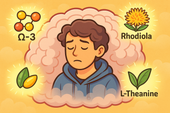
Brain Fog and Body Dysmorphic Disorder: Can Nootropic Supplements Help?
Brain fog often accompanies Body Dysmorphic Disorder, clouding focus and deepening emotional fatigue. Nootropic supplements like L-theanine, Rhodiola, and CoQ10 can help restore mental clarity, balance neurotransmitters, and bring calm energy back to the mind 🌿🧠.
-

How Stress Hormones Like Cortisol May Worsen Body Dysmorphic Disorder
Chronic stress floods the brain with cortisol — the hormone that keeps you on high alert. In Body Dysmorphic Disorder, this chemical overdrive fuels anxiety, distorts self-image, and traps the body in survival mode. Calming cortisol helps restore both peace and perspective 🌿🧠.
-

The Role of Neurotransmitters in BDD—and How Supplements May Help
Neurotransmitters like serotonin, dopamine, glutamate, and GABA shape how people with Body Dysmorphic Disorder perceive themselves. When these brain messengers fall out of balance, perception distorts — but targeted supplements can help restore calm, focus, and emotional regulation 🧠🌿.
-

What Is Body Dysmorphic Disorder? A Deeper Look at the Mind-Body Connection
Body Dysmorphic Disorder (BDD) isn’t just about appearance — it’s about perception. When brain chemistry, trauma, and stress distort self-image, the mind begins to see flaws that aren’t truly there. Healing starts by calming the nervous system and reconnecting mind and body 🪞🧠.
-

Keeping Calm in Competitive Sports: How to Train Your Mind, Body, and Chemistry for Peak Performance
Competitive pressure can overwhelm even the strongest athletes — but calm is trainable. By combining supplements like magnesium, L-theanine, and adaptogens with breathwork and mindset training, you can stay focused, balanced, and in control under any level of stress 🧠🏅.
-

Supplements for Parents Facing Toddler Tantrums: Staying Calm When Little Emotions Run Wild
Toddler tantrums can drain even the most loving parent — but your calm is powerful. With the right supplements like magnesium, L-theanine, and ashwagandha supporting your nervous system, you can stay patient, grounded, and kind, even when emotions run high 🧸🌿.
-

Workplace Stress and Anger Management Support
Workplace stress can quickly turn into frustration — but calm is a skill you can train. By combining supplements like magnesium, L-theanine, and adaptogens with breathwork and mindset tools, you can stay focused, patient, and emotionally grounded no matter how intense the office gets 💼🌿.
-

How to Stay Patient With Family During Stressful Holidays
Holiday gatherings can stir up old stress and test your patience — but calm is possible. With nervous system support from magnesium, L-theanine, and adaptogens, plus mindful breathing and clear boundaries, you can stay centered, kind, and grounded even when family chaos unfolds 🎄💞.
-

Supplements to Keep Calm During Traffic Jams
Getting stuck in traffic doesn’t have to ruin your mood. With calming supplements like magnesium, L-theanine, and ashwagandha, you can train your body to stay relaxed and focused behind the wheel — turning gridlock into a moment of grounded patience 🚗🌿.
-
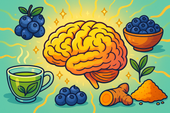
The Role of Antioxidants in Healing Brain Stress from Dissociation
Antioxidants protect the brain from the oxidative stress caused by trauma and dissociation. By neutralizing free radicals and supporting mitochondrial recovery, they help restore clarity, focus, and emotional balance — allowing the mind to heal at the cellular level 🌿🧠.
-
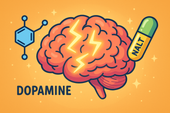
N-Acetyl L-Tyrosine (NALT) for Supporting Mental Clarity
N-Acetyl L-Tyrosine (NALT) fuels dopamine production — the neurotransmitter of focus and motivation. By supporting brain chemistry during stress, NALT helps restore mental clarity, energy, and alertness, making it easier to think clearly and feel present again ⚡🧠.
-

How Ginseng May Improve Focus and Energy in Dissociation
Ginseng helps combat the mental fatigue and fog that often come with dissociation. By supporting mitochondrial energy, balancing neurotransmitters, and regulating cortisol, it gently restores focus, motivation, and emotional presence — helping the mind reconnect with clarity and strength 🌿⚡.
-
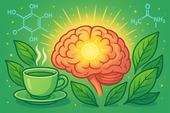
Can Green Tea Extract Help with Dissociative Brain Fog?
Green tea extract may help lift dissociative brain fog by supporting neurotransmitter balance, reducing inflammation, and enhancing energy at the cellular level. With its key compounds EGCG and L-theanine, it promotes calm focus, clarity, and emotional presence — helping you feel more alert and grounded 🍵🧠.
-
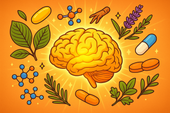
Building a Natural Supplement Stack for Dissociation Support
Building a supplement stack for dissociation means nourishing the brain and body back into communication. By supporting neurotransmitters, gut health, and energy balance through nutrients like magnesium, omega-3s, curcumin, and probiotics, you can help restore clarity, calm, and connection — one layer at a time 🌿🧠.
-

Chamomile and Lavender for Dissociative Anxiety Relief
Chamomile and lavender work together to calm dissociative anxiety by soothing the nervous system and restoring emotional safety. Their natural compounds balance cortisol, enhance GABA activity, and activate the vagus nerve — helping you feel grounded, connected, and at peace again 🌿💜.
-
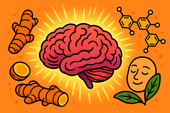
Curcumin for Inflammation and Mental Clarity in Dissociation
Curcumin, the golden compound in turmeric, does more than fight inflammation — it helps clear the mental fog often tied to dissociation. By calming neuroinflammation, balancing neurotransmitters, and supporting mitochondrial energy, curcumin can restore mental clarity, focus, and emotional presence 🌿🧠.
-
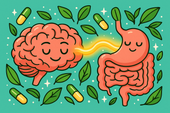
Probiotics and Dissociation: Exploring the Gut–Brain Axis
The gut–brain axis plays a vital role in emotional awareness and presence. When the microbiome is balanced, it supports serotonin production, vagus nerve activity, and calm focus. Probiotics help repair this connection — restoring safety, clarity, and the feeling of truly being in your body again 🌿🧠.
-
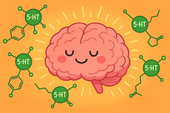
5-HTP for Dissociation: Supporting Serotonin and Emotional Stability
5-HTP helps bridge the gap between emotional numbness and stability by supporting serotonin production — the neurotransmitter that shapes mood, sleep, and sensory awareness. For people experiencing dissociation, 5-HTP may gently restore connection, presence, and emotional balance from the inside out 🌿🧠.
-
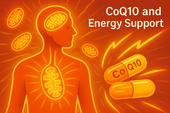
CoQ10 and Energy Support for People with Dissociation
Chronic dissociation often leaves the body running on empty — tired, foggy, and disconnected. CoQ10 helps recharge that system at the cellular level by restoring mitochondrial energy, reducing oxidative stress, and supporting the brain’s capacity to stay present. It’s energy medicine for both body and mind ⚡🧠.

















































